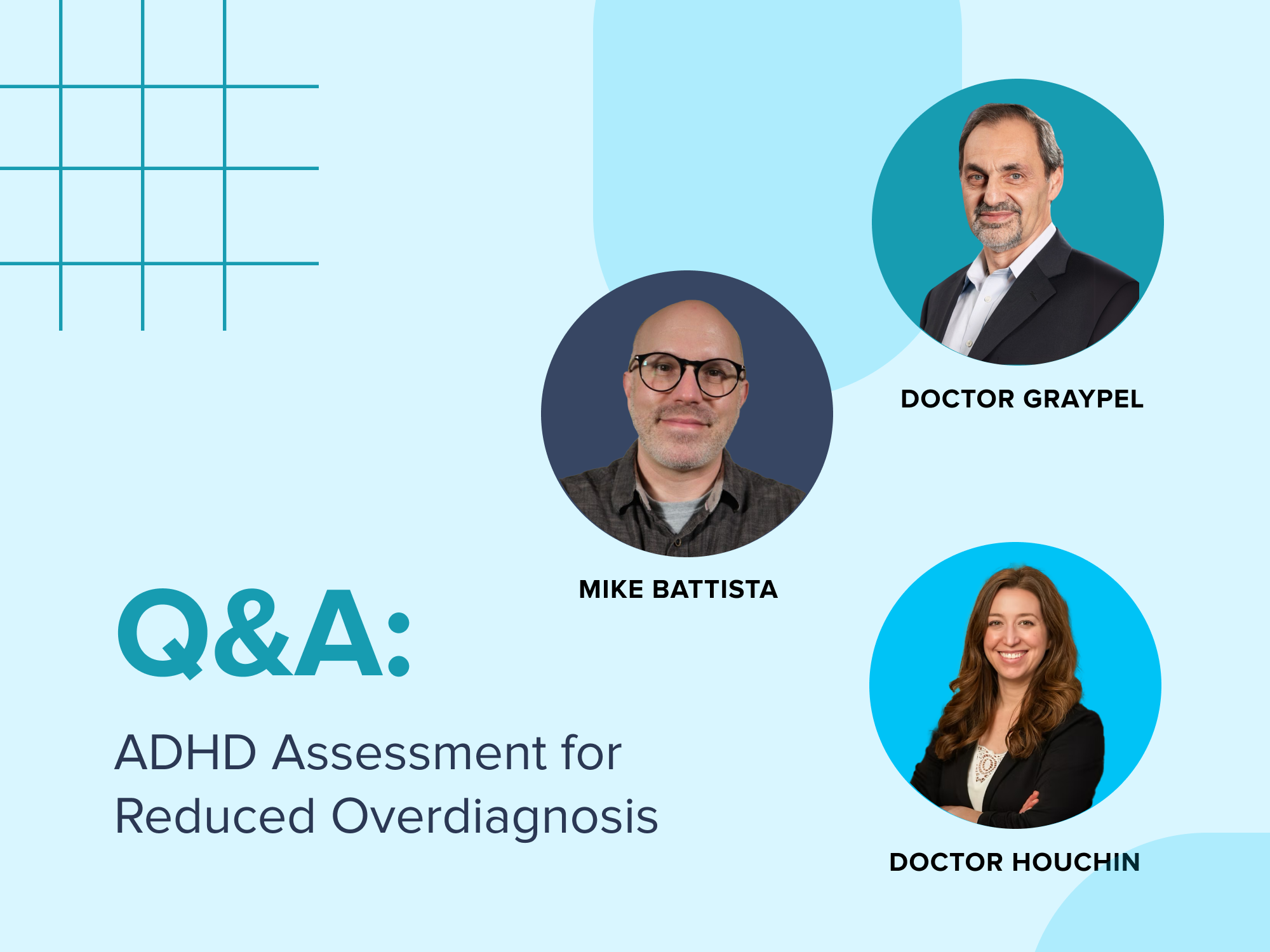
ADHD Assessment for Reduced Overdiagnosis: A Q&A
Published: 06/10/2025 | 3 min read
Written by: Dayna Lang, Content Marketing Manager at Creyos
As public awareness of attention deficit hyperactivity disorder (ADHD) grows, practitioners face an uphill battle. Clinicians are receiving more and more requests for ADHD testing for both children and adults. While widespread awareness, reduced stigma, and open conversations are all positive societal changes, many individuals seeking a diagnosis may have been misinformed by inaccurate information online.
This puts a lot of pressure on healthcare providers to provide confident, efficient, and accurate diagnoses. There is a lot of unverified information floating around the internet, and clinicians have the difficult job of wading through the noise to find the answers this growing patient base needs.
With this boom in diagnosis requests, clinicians have the opportunity to leverage stronger, digital objective measures to give patients clear answers backed by performance data about their cognitive abilities to shed light on the nature of their symptoms.
Objective Assessments for More Confident ADHD Diagnosis
Even with this growing awareness of the condition, ADHD remains difficult to properly assess and diagnose. Creyos explores this topic in an in-depth webinar, examining why these challenges exist and discussing the need for more objective assessments to support clinical decision-making.
Webinar participants included Dr. Ashley Houchin, a licensed clinical psychologist and founder of Lotus Bloom Psychology, Dr. Ernest Graypel, a psychiatrist and a community long-term care psychiatry medical director, and Dr. Mike Battista, the director of science and research at Creyos.
Is there an increasing demand for ADHD diagnosis, and what does that increasing demand look like?
Doctor Graypel:
“There is absolutely an increasing demand for ADHD diagnosis… Not all the patients coming to us are asking to be tested for ADHD. They're coming to us with the consequences of this. They're coming to us with anxiety, depression, self-esteem issues, and some of these patients were never evaluated by psychiatrists.
Some of these people have been treated by psychologists or psychiatrists or both and were diagnosed with or are diagnosed with treatment-resistant depression, deal with severe anxiety issues, or even develop a personality disorder, which also might be a consequence of never being treated, never being addressed for ADHD. So people are more open. They're coming to us. And yes, to answer your question, simply yes. There is increased demand. And, yes, unfortunately, these people are still coming to us, and the numbers are very much increasing.”
Doctor Houchin:
“Since we treat patients across the lifespan, we've seen a kind of consistent referral base for children seeking the diagnosis … but we've seen a significant increase in the number of adults over the last three to five years. They're inquiring as to whether or not what they're experiencing is ADHD, and how, maybe sometimes, the symptoms of ADHD could get overlooked or misinterpreted.”
Doctor Graypel:
"These people, not only children, adults included, who are not reaching their full potential, at their home, at their school, or at their work, are usually, unfortunately, still labeled as lazy or not smart enough.
It drives their self-esteem down, and these people usually just sit over there, getting anxious, getting depressed … they learn hopelessness, helplessness. [But the] growing awareness of ADHD has caused a boom in demand for precise and efficient clinical decision-making. This places a lot of pressure on providers to properly assess patients to understand the true nature of their symptoms for an accurate diagnosis."
Objective ADHD Assessments From Creyos
So, with ADHD cases increasing alongside awareness, how can providers keep up? How can they obtain the data necessary to give them the clinical confidence they need and, at the same time, improve their workflow to help as many patients as possible? The answer lies in cognitive testing that provides objective patient data used alongside subjective information from self-report questionnaires for a comprehensive look into the entire patient experience.
What advancements are we beginning to see in ADHD assessment?
Mike Battista, Director of Science & Research at Creyos:
“You know, there's no underlying pathology that we think causes the symptoms of ADHD. There's no blood test for a virus. There's no single gene that causes ADHD. So when you turn to neuroscience, you might think that brain imaging might be different.
You know, since ADHD is so closely related to cognitive differences. But it's kind of the same story, there's no difference in the brain structure or activity of people with ADHD that's kinda large enough to be clinically useful …
The symptoms are ADHD, and ADHD is the symptoms … it's kind of a spectrum or just a collection of symptoms. And the subjectivity of that is what makes some researchers and some clinicians a bit uncomfortable. But adding objective assessments supported by actual scientific research, that's the kind of advanced hunger of today—more objective assessments.”
Objective testing makes wading through endless ADHD assessments easier and allows providers to back up their clinical decisions with confident, detailed analyses of cognitive function in addition to subjective measures from patient reports. Creyos offers providers the ability to measure 14 cognitive markers that are associated with ADHD, alongside industry-standard questionnaires for detailed and comprehensive ADHD assessment.
Learn more about how Creyos can help streamline your workflows while giving you clinical confidence in this article about our full ADHD Assessment, or speak with one of our representatives about receiving a full product demo.





